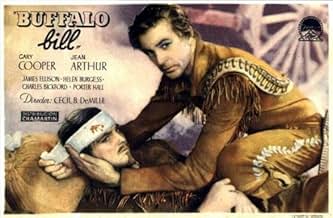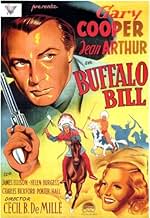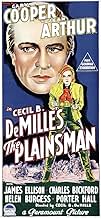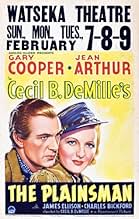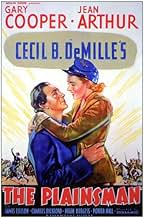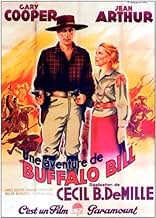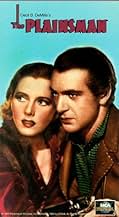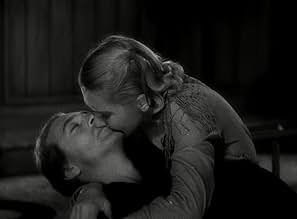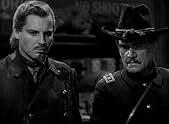IMDb RATING
6.8/10
2.5K
YOUR RATING
Wild Bill Hickok and Buffalo Bill Cody attempt to stop an Indian uprising that was started by white gun-runners.Wild Bill Hickok and Buffalo Bill Cody attempt to stop an Indian uprising that was started by white gun-runners.Wild Bill Hickok and Buffalo Bill Cody attempt to stop an Indian uprising that was started by white gun-runners.
- Awards
- 3 wins total
Fred Kohler
- Jake - A Teamster
- (as Fred Kohler Sr.)
Pat Moriarity
- Sgt. McGinnis
- (as Pat Moriarty)
Featured reviews
With the end of the North American Civil War, the manufacturers of repeating rifles find a profitable means of making money selling the weapons to the North American Indians, using the front man John Lattimer (Charles Bickford) to sell the rifles to the Cheyenne. While traveling in a stagecoach with Calamity Jane (Jean Arthur) and William "Buffalo Bill" Cody (James Ellison) and his young wife Louisa Cody (Helen Burgess) that want to settle down in Hays City managing a hotel, Wild Bill Hickok (Gary Cooper) finds the guide Breezy (George Hayes) wounded by arrows and telling that the Indians are attacking a fort using repeating rifles. Hickok meets Gen. George A. Custer (John Miljan) that assigns Buffalo Bill to guide a troop with ammunition to help the fort. Meanwhile the Cheyenne kidnap Calamity Jane, forcing Hickok to expose himself to rescue her.
The dated "The Plainsman" is a great deception, with a pretentious and shallow story without historical accuracy, "politically incorrect" in the present days and a terrible screenplay that wastes Gary Cooper and Jean Arthur. Their performances are below average with awful characters. The best part is the beginning, with the inception of the lobby of the greedy manufacturers of weapons using the repeating rifles to provide Indian (and also "white man") annihilation in the name of the pockets full of money. My vote is five.
Title (Brazil): "Jornadas Heróicas" ("Heroic Journeys")
The dated "The Plainsman" is a great deception, with a pretentious and shallow story without historical accuracy, "politically incorrect" in the present days and a terrible screenplay that wastes Gary Cooper and Jean Arthur. Their performances are below average with awful characters. The best part is the beginning, with the inception of the lobby of the greedy manufacturers of weapons using the repeating rifles to provide Indian (and also "white man") annihilation in the name of the pockets full of money. My vote is five.
Title (Brazil): "Jornadas Heróicas" ("Heroic Journeys")
After the failure of "The Crusades" at the box office, Cecil B. DeMille stopped doing films about non-American history. His films for the next thirteen years were about our history from Jean Lafitte to World War II (Dr. Wassell). The first in order of production was this film, starring Gary Cooper as Wild Bill Hickok, with Jean Arthur as Calamity Jane. James Ellison was Buffalo Bill, John Miljan (not a villain as usual) was General George A. Custer, and Anthony Quinn was one of the Indians who fought at Little Big Horn. The villains were led by Charles Bickford (selling arms to the Indians) and Porter Hall as Jack McCall (who killed Wild Bill Hickok).
Basically the film takes up the history of the U.S. after the Civil War. Lincoln is shown at the start talking about what is the next step now that Lee has surrendered. Lincoln talks about the need to secure the west (more about this point later). Then he announces he has to go to the theater. That April 14th must have been very busy for Abe - in "Virginia City" he grants a pardon to Errol Flynn at the request of Miriam Hopkins on the same date.
Actually, while Lincoln was concerned about the West, his immediate thoughts on the last day of his Presidency were about reunifying the former Confederate states and it's citizens into the Union as soon as possible. It was Reconstruction that occupied his attention, not the west (except for the problems of Maximillian and his French controlled forces in Mexico against Juarez). But he had been involved in actual problems with the West. In 1862 he sent disgraced General John Pope, the loser at Second Manassas, to Minnesota to put down a serious Indian war by the Sioux (the subject of McKinley Kantor's novel, "Sprit Lake". Pope, incompetent against Lee and Jackson, turned out to be quite effective here, and the revolt was smashed.
However, with all Lincoln's actual attention to western problems, it is doubtful that he says (as Cooper repeats at least once), "The frontier should be secure." There is nothing to say he could not have said it, but it is hardly a profound pronouncement by a leading statesman. Like saying, Teddy Roosevelt said, "Eat a good breakfast every morning for your health." It is not a profound statement of policy. It is, at best, a statement of recognizable fact. Cooper turning it into a minor mantra, like Lincoln's version of the Monroe Doctrine, is ridiculous...typical of the way DeMille's scripts have really bad errors of common sense in them.
However, this is not a ruinous mistake. "The Plainsman" is an adventure film, and as such it has the full benefit of DeMille the film creator of spectacle. As such it is well worth watching. But not as a textbook on Lincoln's political ideas or his quotable legacy.
Basically the film takes up the history of the U.S. after the Civil War. Lincoln is shown at the start talking about what is the next step now that Lee has surrendered. Lincoln talks about the need to secure the west (more about this point later). Then he announces he has to go to the theater. That April 14th must have been very busy for Abe - in "Virginia City" he grants a pardon to Errol Flynn at the request of Miriam Hopkins on the same date.
Actually, while Lincoln was concerned about the West, his immediate thoughts on the last day of his Presidency were about reunifying the former Confederate states and it's citizens into the Union as soon as possible. It was Reconstruction that occupied his attention, not the west (except for the problems of Maximillian and his French controlled forces in Mexico against Juarez). But he had been involved in actual problems with the West. In 1862 he sent disgraced General John Pope, the loser at Second Manassas, to Minnesota to put down a serious Indian war by the Sioux (the subject of McKinley Kantor's novel, "Sprit Lake". Pope, incompetent against Lee and Jackson, turned out to be quite effective here, and the revolt was smashed.
However, with all Lincoln's actual attention to western problems, it is doubtful that he says (as Cooper repeats at least once), "The frontier should be secure." There is nothing to say he could not have said it, but it is hardly a profound pronouncement by a leading statesman. Like saying, Teddy Roosevelt said, "Eat a good breakfast every morning for your health." It is not a profound statement of policy. It is, at best, a statement of recognizable fact. Cooper turning it into a minor mantra, like Lincoln's version of the Monroe Doctrine, is ridiculous...typical of the way DeMille's scripts have really bad errors of common sense in them.
However, this is not a ruinous mistake. "The Plainsman" is an adventure film, and as such it has the full benefit of DeMille the film creator of spectacle. As such it is well worth watching. But not as a textbook on Lincoln's political ideas or his quotable legacy.
This movie has Wild Bill Hickok, Calamity Jane, Buffalo Bill and General Custer all together. Gary Cooper plays Wild Bill and Jean Arthur plays Calamity Jane and Charles Bickford plays the bad guy who sells weapons to the Indians and you can hardly recognize him. This was the first time Cecil B. DeMille and Gary Cooper worked together and the next movie the made was basically the same but set in a different time. This movie starts out with Lincoln's assassination and it also deals with an Indian war. Calamity Jane is in love with Wild Bill and Buffalo Bill has gotten married and now wants to stay home. This movie also deals with Custer's last stand and is far from accurate. Gary Cooper is good as usual and i usually don't like Jean Arthur but i liked her here.
The master of movie spectacle Cecil B. De Mille goes West. Using three legends of the old west as its protagonists (they probably never met),Gary Cooper is portraying Wild Bill Hickock,James Ellison as Buffalo Bill and Jean Arthur does make a nice Calamity Jane. The story serves only for De Mille to hang some marvelous action sequences on, like the big Indian attack.Scenes like that are extremely well done.If you don't mind the somewhat over-the-top performances of the cast this is an very entertaining western.Look out for a very young Anthony Quinn essaying the role of an Indian brave who participated at the battle of Little Big Horn.This part got him at least noticed in Hollywood.
Surely the only Western featuring Wild Bill Hickok, Calamity Jane, Buffalo Bill Cody, George Custer, and Abraham Lincoln! After a slow start, it hits its stride for a while but eventually runs out of ideas and seems to go on forever. Cooper tries hard to make Hickok come alive and Arthur brings her usual spunk to Calamity Jane but Ellison is over matched as Buffalo Bill. DeMille's direction is uninspired; it seems he was more interested in creating an epic than telling a good story. There is enough decent material here that a good director and editor could have turned it into an exciting movie of about 90 minutes. Sadly, Burgess, who plays Mrs. Cody in her film debut, died a year later at age 20.
Did you know
- TriviaJohn Wayne very much wanted the role of Wild Bill Hickok, which he felt certain would make him a star, but director Cecil B. DeMille wanted Gary Cooper instead.
- GoofsOn the evening of Lincoln's assassination Van Ellyn and his associates are discussing the supposedly then current John Soule editorial, "Go West, Young Man." Lincoln was murdered in 1865. Soule wrote that famous line in 1851.
- Quotes
Calamity Jane: Tip your hat when you speak to a lady!
Wild Bill Hickok: I will... when I speak to a lady.
- Alternate versionsThe UK DVD is cut by 2 secs to remove a horsefall.
- ConnectionsFeatured in The Hollywood Collection: Anthony Quinn an Original (1990)
- SoundtracksWhen Johnny Comes Marching Home
(1863) (uncredited)
Written by Louis Lambert
Played as background music for the first scene, Washington, D.C.
- How long is The Plainsman?Powered by Alexa
Details
- Release date
- Country of origin
- Language
- Also known as
- The Plainsman
- Filming locations
- Cheyenne Indian Reservation, Lame Deer, Montana, USA(Custer's massacre)
- Production company
- See more company credits at IMDbPro
Box office
- Budget
- $1,000,000 (estimated)
- Runtime1 hour 53 minutes
- Color
- Aspect ratio
- 1.37 : 1
Contribute to this page
Suggest an edit or add missing content



